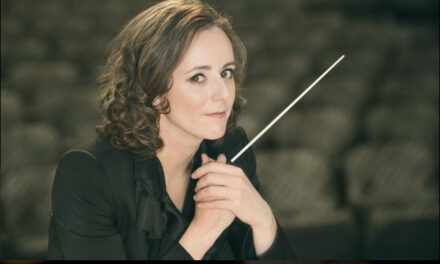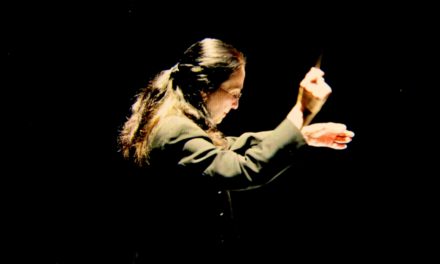By Daniel Buckwalter
(#CommonManAtTheSymphony)
The one thing young classical music composers are supposed to do is startle the audience, to stretch the limits of what was previously imagined in traditional symphonic music, any music, and force listeners to think.
To that end, Gabriella Smith’s very first symphony — ONE For Orchestra, which had its Northwest premier with the Eugene Symphony Orchestra on March 16 — was a rousing success.
Under the direction of Francesco Lecce-Chong, the four-movement piece certainly did make one think of climate change and, perhaps, of the possible reshaping of what symphonies will sound like in the generations to come.
Smith, a 31-year-old Bay Area native and an environmentalist who already has an extensive track record of accomplishments under her belt, is involved in the Eugene Symphony’s First Symphony Composer program.
She has a wonderful future ahead of her, yet her music has to be absorbed with understanding of the world she and her generation are inheriting.
ONE is not melodic. Far from it, it is a cacophony of chaos where traditional instruments that are played in an entirely different manner. It perfectly reflects — after two days of reflecting on it myself — the growing problems created by climate change: the screaming whiplash of drought and flooding, the increasing number of tornadoes and hurricanes, and, of course, the relentless wildfires.
Still, ONE thankfully does not descend into a political statement. Instead, in program notes because she wasn’t able to attend the concert due to illness, Smith asks listeners to discover their own meaning inside the piece, inside her love of environmentalism.
“Listening can be so personal; it becomes about the listener’s journey rather than the composer’s intent,” she said. “I’d like people to take away the bigger concept rather than a specific moment.”
And, she added, “I wanted to bring the joy environmentalism to the music, not the despair.”
For the most part — chatter at intermission with fellow patrons — I believe the near-capacity audience at the Hult Center’s Silva Concert Hall did just that, hearing the rain, the hail and the wind, and reflecting on their own experiences with the environment.
There were exceptions from traditionalists, I’m certain, but I also know that I’m in my early 60s now, and I am often one of the “younger ones” at the symphony.
It’s time to get on board with the future.
There was some of the familiar on March 16, to be sure. In its glory, that came from Sergei Rachmaninov’s Piano Concerto No. 3 with guest pianist Daniel Hsu.
The 25-year-old Hsu was simply masterful. His grace seemed effortless from start to finish, and it was a treasure for all to both hear and see his virtuosity. He deserved every second of his standing ovation.
Overall, it was another thoughtful and wonderful night with the Eugene Symphony Orchestra. And don’t worry about the youth movement in classical music. It is present, inventive, and fun.












